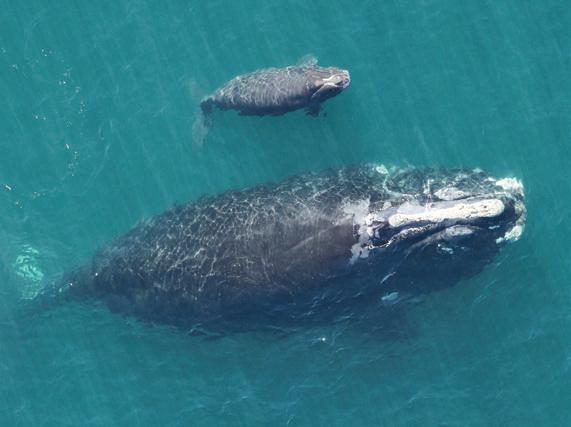
3 minute read
WhaleAlert
Submitted by International Fund for Animal Welfare (IFAW)
Right whale #3157 spotted with a calf off Cumberland Island on Feb. 10, 2022. Whale Alert allows boaters like you to report sightings. Photo by Florida FWC, taken under NOAA permit 0556-01 A free app for your phone allows you to see right whales that have been reported in local waters, and report whales you observe, thereby aiding in vessel strike prevention.
Advertisement
One of the most iconic whales found along the southern coast, the critically endangered North Atlantic right whale has a dwindling population of fewer than 340 individuals. Since 2017, a near catastrophic 50 right whales have been found, or presumed to be, dead. One cause for this is vessel strikes, which often result in severe injury or fatality to whales, as well as significant damage to vessels and their occupants.
To reduce risk to whales and protect boaters on the water, you can download Whale Alert (www.whalealert.com), a free citizen science app using whale sightings reported by users to help prevent potential vessel strikes.
Whale Alert launched in 2012 as the result of collaboration between NOAA Stellwagen, the University of New Hampshire Center for Coastal and Ocean Mapping, IFAW, and Conserve. IO. The app was borne of the desire to help boaters understand and monitor conservation measures that affected them, with an interface displaying conservation zones overlaid with NOAA nautical charts.
Whale Alert has continued to grow, partnering with Woods Hole Oceanographic Institute to display whale sightings from acoustic buoys and gliders. Users can report whale sightings directly in the app, which are shown in near-real-time. This feature enables boaters to be part of a proactive solution to reduce risks to themselves, their vessels, and whales.
While its inception originated in the shipping community, Whale Alert is not industry-specific. It is designed to be used by anyone who downloads the free app; sightings can be logged by recreational boaters, whale watchers, beachgoers, sailors, fishermen, and so on. If you can see a whale, you can add your sighting in Whale Alert!
Users can report a sighting at their current location by simply selecting the "Report Sighting" button, entering the species information, number of observations, dates, and sources of the sightings. There is also an option to upload images and notes. The sighting feature asks if the whale is dead or distressed, facilitating contact with regional management professionals to respond to the emergency and increasing the likelihood of a whales’ survival.
To ensure accurate data is collected, sightings are reviewed prior to their addition to the map; however, regular users of the app can become trusted observers, to streamline the review process.
With roughly 35,000 sightings made to date, Whale Alert has been able to provide quality data to resource managers so they can implement more effective mechanisms for protecting whales and boaters. Over time, this data can be used to determine whale migration patterns and prevent vessel strikes in areas of heavy traffic by redirecting boaters and/or more effectively indicating when to reduce speed.
Whale Alert is making a conscious effort to recruit more recreational boaters, who will benefit from mariner specific features. Using built-in GPS technology found in compatible devices, the app pushes an alert to users when they enter active management zones. By doing so, Whale Alert makes it easier for boaters to navigate the evolving network of overlapping management zones and shipping lanes. The app also notifies larger vessels if they enter a Mandatory Ship Reporting zone (MSR), a NOAA reporting measure required in designated right whale areas.
Tools like Whale Alert are vital for protecting the North Atlantic right whale. The extinction of this species is imminent within our lifetimes if immediate action is not taken
Whale Alert enables you to directly contribute to making the ocean a safer environment for right whales, and for the people who work and play alongside them.
GET THE APP
To download the app, visit your app store and search Whale Alert.
To learn more, visit: www.whalealert.org









